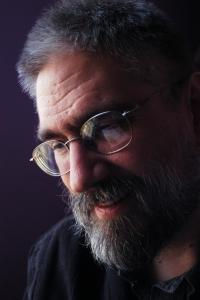Gregory of Nyssa and Evagrius Ponticus
For those of you who think I've abandoned my "101 Mystics" project (a commitment to read at least 101 of the greatest of western mystics in roughly chronological order, including voices from the Pagan, Jewish, Christian and Muslim wisdom traditions), well, here's a long-awaited update. Early this year I finally finished reading Gregory of Nyssa's The Life of Moses, and followed that up with his younger contemporary Evagrius Ponticus' The Praktikos and Chapters on Prayer. Both are wonderful books, but in very different ways. Of course, both also reflect the harshness of the desert milieu where Christian mysticism retreated in the fourth century, in response to the legalisation of the religion under Constantine. The Life of Moses is on the surface precisely what the title suggests — a biography of the great lawgiver of the Hebrews. But it also is "mystical" in the most ancient sense of the word, for Gregory's sustained meditation on the key events in the life of Moses unpacks layer after allegorical layer of symbolism and theological insight. It seems as if every detail of Moses' career in Egypt, his leadership of the Exodus, his negotiations with God that culminated in the giving of the 10 Commandments, all the way to the culmination of his life just outside the Promised Land, all becomes fodder for Gregory's richly metaphorical reading of the inner truths beneath the outer form. Of course, for us who approach mysticism here in the third millennium, this study could seem disappointing, for to Gregory "mysticism" merely means the unpacking of the mysteries of the faith — which may or may not have anything to do with the elevation of consciousness or the experience of Divine Union. Indeed, The Life of Moses seems ultimately to be about the cultivation of Christian virtue more than anything else. Seen against the backdrop of later models of the mystical life, this is a book wholly concerned with the purgative way, rather than the ways of illumination or union.
The Life of Moses is on the surface precisely what the title suggests — a biography of the great lawgiver of the Hebrews. But it also is "mystical" in the most ancient sense of the word, for Gregory's sustained meditation on the key events in the life of Moses unpacks layer after allegorical layer of symbolism and theological insight. It seems as if every detail of Moses' career in Egypt, his leadership of the Exodus, his negotiations with God that culminated in the giving of the 10 Commandments, all the way to the culmination of his life just outside the Promised Land, all becomes fodder for Gregory's richly metaphorical reading of the inner truths beneath the outer form. Of course, for us who approach mysticism here in the third millennium, this study could seem disappointing, for to Gregory "mysticism" merely means the unpacking of the mysteries of the faith — which may or may not have anything to do with the elevation of consciousness or the experience of Divine Union. Indeed, The Life of Moses seems ultimately to be about the cultivation of Christian virtue more than anything else. Seen against the backdrop of later models of the mystical life, this is a book wholly concerned with the purgative way, rather than the ways of illumination or union.
Evagrius Ponticus was a disciple of Gregory's colleague, Gregory of Naziansus (the two Gregorys, along with Basil the Great, are collectively known as the "Cappadocian Fathers," three important fourth-century theologians from the region of Cappadocia in modern Turkey). Evagrius eventually took his faith literally into the desert, and became one of the most renowned of the 4th century Desert Fathers and Mothers. Alas, he was also a student of Origen, the great 3rd century mystic/theologian of Alexandria; and when Origen was eventually condemned for heresy, Evagrius suffered a similar fate. But just as many scholars of mysticism in our day have attempted to rehabilitate Origen's reputation by pointing out that bulk of his teaching falls within the bounds of orthodoxy, so too does Evagrius have his advocates. Scholars point out that only in a few of Evagrius' more theologically speculative writings does he exhibit the influence of Origen; most of his ascetical writings — that is to say, writings aimed at supporting the nurture of the spiritual life — are not only theologically orthodox, but filled with profound common sense and psychological acumen.The Praktikos and Chapters on Prayer certainly delivers the contemplative goods. Basically, these are two short manuals of instruction on the life of prayer, written for monastics (here begins the long history of Christian mysticism as essentially being the province of the cloister) but clearly astute about the challenges of cultivating a mindful approach to the effort to "pray without ceasing." Like Gregory of Nyssa, Evagrius' writings might strike the modern reader as being overly concerned with morality and the taming of the passions. Once again, here we see in the early centuries of the Christian mystical tradition an emphasis on purgation (which, of course, will never fully fade away from what orthodox mystics consider important). But Evagrius is perhaps the earliest of Christian mystics to write beautifully and poetically about the necessity of moving beyond discursive thought into a place of repose in Divine Presence. The first contemplative (in the modern sense of the word)? Who can say. But probably the first writer to articulate the promise of engaging with profound silence as a doorway to the mystical life. And within all of the harsh desert-inspired rhetoric about taming the passions (and the body), Evagrius still manages to pierce through the veil and offer up simple, epigrammatic statements of profound insight, such as this little gem from toward the end of the Chapters on Prayer: "Happy is the monk who considers all men as god — after God."
Amen.

